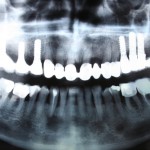
Dental implants are an increasingly common element of dental treatment demonstrating good success rates. Smoker have a higher rate of tooth loss than non-smokers and studies have also demonstrated a higher risk of dental implant loss in smokers.
The aim of this review was to assess whether there was an increased risk of dental implant failure in heavy smokers compared with light smokers.
Methods
Searches were conducted in the PubMed, Embase, Scopus and Web of Science databases. Randomised-controlled clinical trials, cohort studies, case–control studies, and case series assessing the effect of smoking on dental implant failure were considered. Studies were excluded if smoking was not categorised.
Two reviewers screened studies for inclusion. A single reviewer extracted data with study quality being assessed using the Newcastle-Ottawa scale (NOS). Fixed- or random-effects meta-analyses were used to pool the estimates of relative risk (RR) with 95% confidence intervals (CI).
Results
- 23 studies (1RCT, 6 prospective studies, 16 retrospective studies) were included.
- 22 of the included studies were considered to be of high-quality scoring 6 or more on the NOS.
- 4 Meta-analyses for ‘implant failure’ based on implant related data are presented below.
| No of studies | RR (95%CI) | |
| <10 cigarettes/day and non-smokers | 14 | 1.28 (1.00 – 1.64) |
| >10 cigarettes/day and non-smokers | 14 | 2.40 (1.71 – 3.36) |
| <20 cigarettes/day and non-smokers | 8 | 1.46 (1.22 – 1.76) |
| >20 cigarettes/day and non-smokers | 8 | 2.51 (1.47 – 4.28) |
Meta-analyses were also conducted on patient-based data
| No of studies | RR (95%CI) | |
| <10 cigarettes/day and non-smokers | 11 | 0.99 (0.63 – 1.56) |
| >10 cigarettes/day and non-smokers | 11 | 1.56 (1.18 – 2.06) |
| <20 cigarettes/day and non-smokers | 4 | 2.82 (1.87 – 4.25) |
| >20 cigarettes/day and non-smokers | 4 | 4.00 (2.72 – 5.89) |
- A range of other subgroup and meta-regression analyses were also conducted.
Conclusions
The authors concluded: –
within the limitation of this study, the results suggested that the risk of implant failure was elevated with an increase in the number of cigarettes smoked per day. Smoking more than one pack/day can be considered a risk factor for implant failure. Further studies are suggested to investigate smoking as a continuous variable rather than a categorical one.
Comments
A good range of databases were searched for this review. However, a majority of the included studies were retrospective (69.5%) So while almost all of the included studies scored highly in quality terms there are concerns in relation to selection, recall and attrition bias in the retrospective studies at least. As with other implant reviews there are also variations in the definitions of implant failure which have potential implications. Samples sizes vary from 8 to 3721 patients as does the the mean follow up times (4 months – 5 years).
A crude analysis of the data in this review shows that overall 22,070 implants were placed in non-smokers with 753 failures (3.4%) and 7297 in smokers with 472 failures (6.5%). Previous reviews (Dental Elf – 14th Oct 2015 & 13th May 2013) have suggested higher failure rates in smokers that non-smokers and this new review hints at higher failure rates in heavier smokers. However the quality of the available evidence is limited and better quality prospective studies are needed to help clarify the rick of implant failure in heavier smokers.
Links
Primary Paper
Naseri R, Yaghini J, Feizi A. Levels of smoking and dental implants failure: A systematic review and meta-analysis [published online ahead of print, 2020 Jan 19]. J Clin Periodontol. 2020;10.1111/jcpe.13257. doi:10.1111/jcpe.13257
Other references
Dental Elf – 14th Oct 2015
Dental Elf – 13th May 2015
Dental implants: smokers have poorer outcomes suggests review
